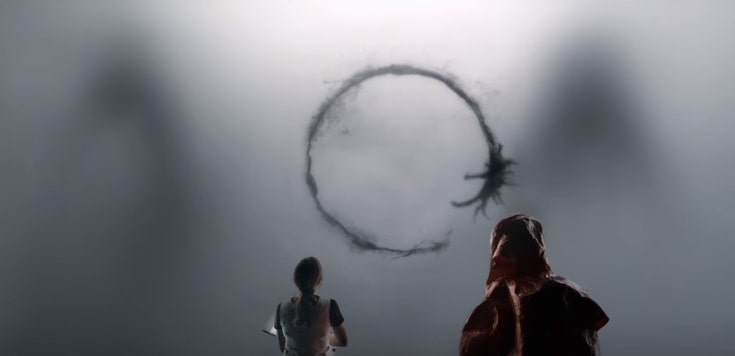
Arrival
Based on the trailer, this wasn’t a film I had a particular interest in seeing (although there’s a lot of appeal to “mood” films). However, it isn’t fair to hold the marketing against it because the majority of trailers today make no fucking sense. There are a lot of perks to this movie, but I’m voting it a “No” for several reasons.
The most glaring problem with this film is its story structure. It’s terrible and runs two premises simultaneously, which ultimately clash and ruin any legitimacy to the point it tries to drive home. That’s because it’s trying to drive home two points, and they aren’t reconcilable elements. Every great story unifies its characters, its dialogue, its action, and its outcome to drive home a singular point – often referred to as the dramatic premise.
Here are a few examples I give, as they’re immediately familiar: Shakespeare’s Othello could be summed up as something to the effect of “jealousy destroys the object of its affection (and itself).” Orson Welles’s Citizen Kane (1941) could be concluded to be about how “ruthless ambition leads to isolation and loneliness.” There’s a causal relationship between the main character’s actions and the inevitable outcome. So what are those of Arrival?
Thankfully, Amy Adams is a great actress and she manages to subtly convey the true, singular, underlying motivation of the character throughout the movie – despite the creator’s every attempt to railroad it with manipulative, melodramatic shit. I’d define her assumed premise as something like “love conquers all, even death” – referring to her choice to continue living a life she knows is going to be plagued by loss and suffering. The love of her daughter transcends the inevitable misery, but for her only – as her husband wishes she hadn’t.
But what about the visit from the alien life and the introduction of a new language? In small ways, it supports this initial premise; in other ways, it introduces an underlying storytelling argument or position that conflicts with itself. And it’s ill-defined. I don’t have a great way to phrase it, but the casual mention of “language rewires the brain” is part of it. Communication manifests reality, which is an interesting point and would make a worthwhile story. Just not in the same film.
 In addition to structural issues, the film is replete with negligent, self-damning devices. Introducing a time travel or manipulation element into a film format is suicide for 99% of mainstream films because we process information in a linear, narrative form. The end result, not surprisingly, is chaos. Amateurs are often drawn to time-travel or time-bending concepts because it seems to alleviate issues in constructing drama that follows logically and necessarily. Scenes in great movies are both unexpected, yet unavoidable.
In addition to structural issues, the film is replete with negligent, self-damning devices. Introducing a time travel or manipulation element into a film format is suicide for 99% of mainstream films because we process information in a linear, narrative form. The end result, not surprisingly, is chaos. Amateurs are often drawn to time-travel or time-bending concepts because it seems to alleviate issues in constructing drama that follows logically and necessarily. Scenes in great movies are both unexpected, yet unavoidable.
Here’s an example of how Arrival fucks its own ass: Adams’s character, Louise Banks, has a want (what moves her to connect with the alien forms) and a need (to sort the death of her child). Because time in the movie is completely arbitrary and she already knows everything she’s ever going to, watching a person go through the motions without any struggle is boring. She never actually had a need; it was predetermined.
While I understand the feelings Villeneuve wanted to create, it plays at odds with the form in which he executed it. Drama is struggle, that’s what makes it interesting. Does this person get what he or she wants most in the world? If the answer is already yes and they’ve had it all along, yet we’re just waiting for that information to be revealed to us, it feels cheap. There’s a huge difference between telling a story that already occurred, and telling one that is happening in real time.
This is a subtle point, and it may seem like excessive nit-picking, but it matters. Louise Banks had, at every point in time within the film, an understanding of how her actions would play out. That she got the gift of knowing all time (front and backwards) does not diminish the fact that she always had what she needed, had already and at every moment made the choice to live the way she wanted knowing the final results.
Amy Adams did a great job resisting enough to keep your attention for the first hour. And when I say “questioning everything” I don’t mean that in a positive way where you don’t fully grasp a complicated topic; it’s that they fucked something up and you’re trying to figure out the reasoning they must’ve used for the producers to greenlight the project.
I haven’t read the original source material, so I can’t say whether or not these unnecessary dramatic elements were added as part of Hollywood’s need to fuck up a good thing, or if they simply didn’t have time to address a complicated, nuanced part of the story but wanted to remain somewhat faithful. Either way, it doesn’t work and should’ve been scrapped. It took them a third of the movie to explain a plot twist that you see coming halfway into the film – so you’re not only bored as this narrative unfolds, but you’re a bit insulted that they assume you’re this stupid.
The other major thing I wanted to point out, which is the product of a lot of films and something I’m CONSTANTLY bemoaning, is how often films TALK AT ME. They show me nothing. The movie is a voiceover sandwiches. Even before we’re introduced to the main character, a voice explains what’s about to happen and then what happens. This is lazy filmmaking, especially given the predominantly visual nature of the medium. I spent $24 to see this movie and the producers spent $47 million…seriously, put a little more effort into these things, you fucking jizz-cocks.
The cool parts involve the actual interactions with the aliens, which heavily emphasise linguistic research. The design of the alien language and the subsequent analyses of their structure was beautiful and fascinating, respectively. Those are the best parts of the film, in my opinion.
I don’t know if you’ll enjoy the film, but you may if you place more meaning into it than is inherent in it. Ambiguity can definitely have value, but only when well-placed and in the service of your story. Putting the responsibility on the audience, rather than the people getting paid forty-seven million fucking dollars to make a strong choice and deliver a cohesive, cogent message, is unforgivable.
